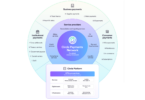Data61, the IT innovation wing of Australia’s federal science agency CSIRO, is working on a blockchain-based payment system that will be able to control how disability allowances are spent. The project is in conjunction with the Commonwealth Bank of Australia (CBA) and the National Disability Insurance Scheme (NDIS).
The trial, called Making Money Smart, is testing the potential for ‘smart money’ to improve the experience of users and service providers.
‘Smart money’ is a form of digital currency that has pre-existing conditions which can dictate when, where and on what it is spent.
A blockchain token will be the basis for the system, and smart contracts will provide the means to program the spending terms and conditions.
“Programmable money represents an opportunity to re-envisage how we think about money and how payments function across the economy,” said Sophie Gilder, Head of Experimentation and Blockchain, Innovation Lab, CBA.
“We’re particularly interested in the broader research opportunity around programmable money, because it should reduce friction in business transactions, and enable companies to create new business models and innovative ways of delivering and paying for products and services,” added Dr Mark Staples, Senior Principal Researcher in the Software and Computational Systems program at CSIRO’s Data61.
The app, which is still being tested by patients and care providers, will allow users to find, book and pay for care from NDIS providers without paperwork or receipts.
NDIS was selected first due to the highly-personalized payment conditions. Each patient has a customized plan which can contain different budget and care categories. These categories can sometimes have rules about how money can be used. So using a personalized payment system could help relieve the administrative burden and provide greater transparency for the Government.
“This has been a really interesting research project into how blockchain technology can integrate with new payments technologies to provide more choice, control, and flexibility for conditional payments for NDIS participants and service providers,” continued Dr. Staples.
The project has received input from numerous organizations including the Reserve Bank of Australia, the Australian Treasury and the Australian Digital Commerce Association.
If successful, the entire blockchain payments solution could integrate with the New Payments Platform, a public settlement and clearing solution, which launched in February 2018.
CBA and Data61 also plan to publish a Making Money Smart report in November, which will examine the strength and weaknesses for an NDIS blockchain system and will include user feedback and recommendations on future use-cases. Data61 is also working on the Australian National Blockchain which aims to store legal contracts.






